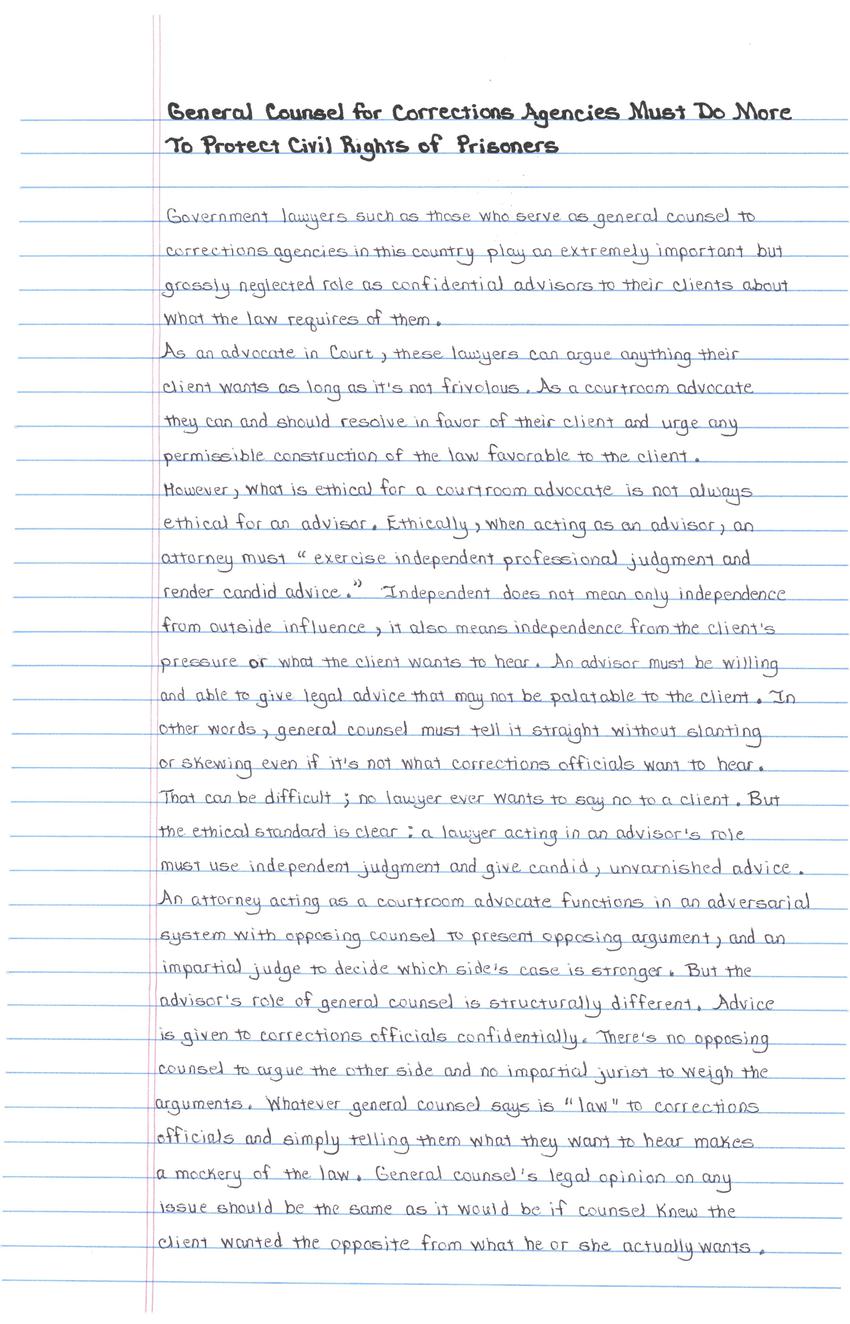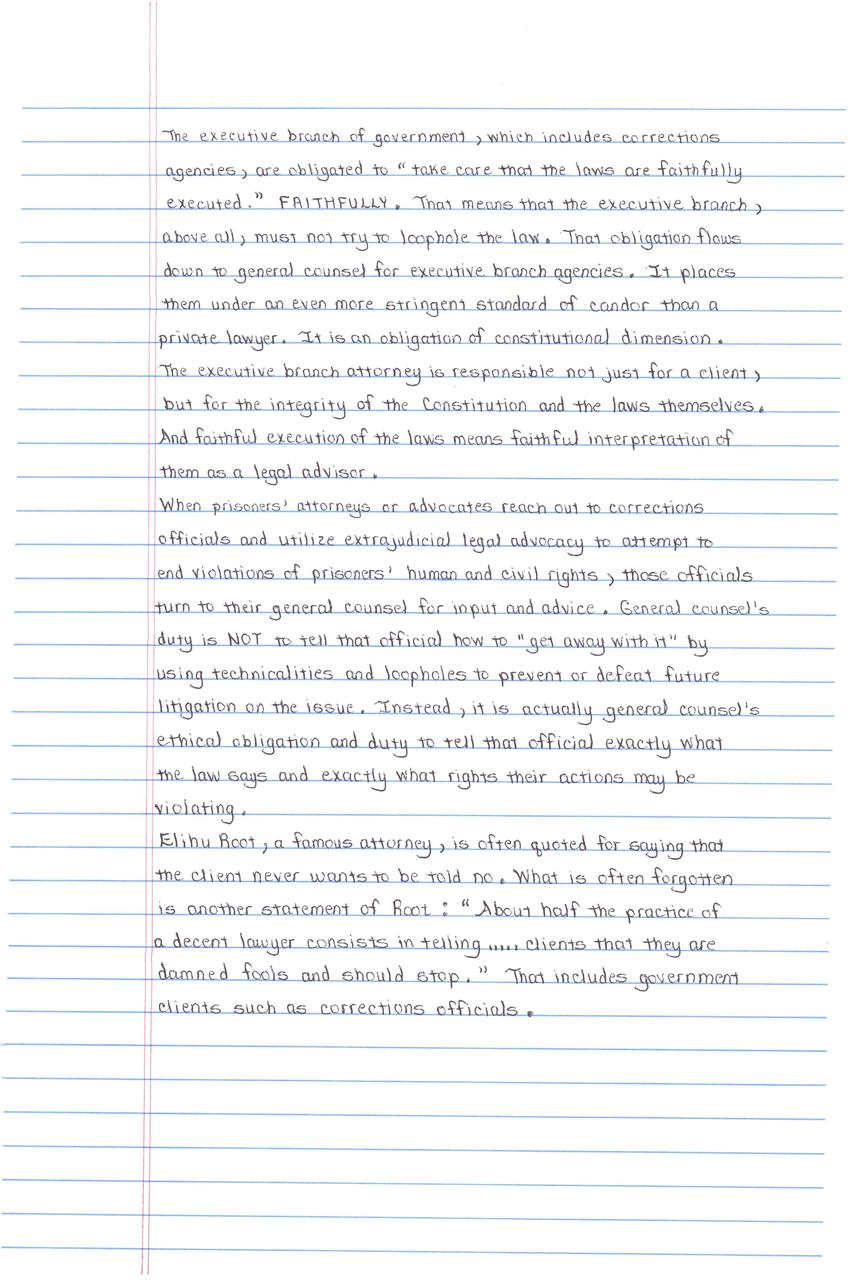General Counsel for Corrections Agencies Must Do More to Protect Civil Rights of Prisoners

Transcription
General Counsel for Corrections Agencies Must Do More To Protect Civil Rights of Prisoners
Government lawyers such as those who serve as general counsel to corrections agencies in this country play an extremely important but grossly neglected role as confidential advisors to their clients about what the law requires of them.
As an advocate in Court, these lawyerscan argue anything their client wants as long as it's not frivolous. As a courtroom advocate they can and should resolve in favor of their client and urge any permissible construction of the law favorable to the client. However, what is ethical for a courtroom advocate is not always ethical for an advisor. Ethically, when acting as an advisor, an attorney must "exercise independent professional judgment and render candid advice." Independent does not mean only independent from outside influence, it also means independence from the client's pressure or what the client wants to hear. An advisor must be willing and able to give legal advice that may not be palatable to the client. In other words, general counsel must tell it straight without slanting or skewing even if it's not what corrections officials want to hear. That can be difficult; no lawyer ever wants to say no to a client. But the ethical standard is clear: a lawyer acting in an advisor's role must use independent judgment and give candid, unvarnished advice. An attorney acting as a courtroom advocate functions in an adversarial system with opposing counsel to present opposing argument, and an impartial judge to decide which side's case is stronger. But the advisor's role of general counsel is structurally different. Advice is given to corrections officials confidentially. There's no opposing counsel to argue the other side and no impartial jurist to weigh the arguments. Whatever general counsel says is "law" to corrections officials and simply telling them what they want to hear makes a mockery of the law. General counsel's legal opinion on any issue should be the same as it would if counsel knew the client wanted the opposite from what he or she actually wants.
The executive branch of government, which includes corrections agencies, are obligated to "take care that the laws are faithfully executed." FAITHFULLY. That means that the executive branch, above all, must not try to loophole the law. That obligation flows down to general counsel for executive branch agencies. It places them under an even more stringent standard of candor than a private lawyer. It is an obligation of constitutional dimension. The executive branch attorney is responsible not just for a client, but for the integrity of the Constitution and the laws themselves. And faithful execution of the laws means faithful interpretation of them as a legal advisor.
When prisoners' attorneys or advocates reach out to corrections officials and utilize extrajudicial legal advocacy to attempt to end violations of prisoners' human and civil rights, those officials turn to their general counsel for input and advice. General counsel's duty is NOT to tell that official how to "get away with it" by using technicalities and loopholes to prevent or defeat future litigation on the issue. Instead, it is actually general counsel's ethical obligation and duty to tell that official exactly what the law says and exactly what rights their actions may be violating.
Elihu Root, a famous attorney, is often quoted for saying that the client never wants to be told no. What is often forgotten is another statement of Root: "About half the practice of a decent lawyer consists in telling.....clients that they are damned fools and should stop." That includes government clients such as corrections officials.
Other posts by this author
|
2023 may 31

|
2023 mar 20

|
2022 aug 23

|
2022 aug 23

|
2022 aug 23

|
2022 aug 23

|
More... |



Replies